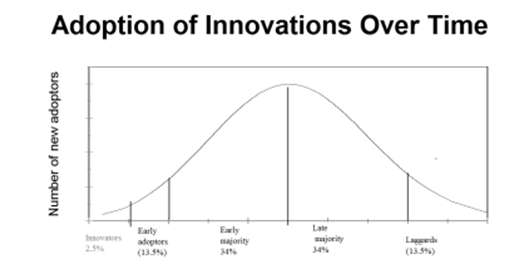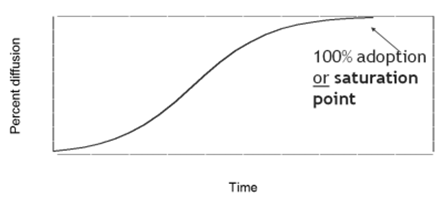Q: How personal influence of consumer behavior can create Diffusion of Innovation.?
Ans: Products be likely to go through a life cycle. Primarily a product is introduced. Since the product isn't well known and is usually expensive (example as microwave ovens were in the late 1970s) sales are usually limited. Ultimately nevertheless many products reach a growth phase sales raise dramatically. More firms come with their models of the product.
Frequently unluckily the product will reach a maturity stage where little growth will be seen. For instance in the United States almost every household has at least one colour TV set. Some products may as well reach a decline stage typically because the product category is being replaced by something better. For instance typewriters experienced declining sales as more consumers switched to computers or other word processing equipment. The product life cycle is joined to the phenomenon of diffusion of innovation.
When a new product comes-out it is probable to first be adopted by consumers who are more innovative than others they are willing to pay a premium price for the new product and take a risk on unproven technology. It is significant to be on the good side of innovators since several other later adopters will tend to rely for advice on the innovators who are thought to be more knowledgeable about new products for advice.
At later stage of the PLC the firm may need to modify its market strategy. For instance facing a saturated market for baking soda in its traditional use Arm ü Hammer launched a major campaign to get consumers to use the product to deodorize refrigerators. Deodorizing powders to be utilized before vacuuming were also created. It is sometimes helpful to think of products as being either new or existing. Many firms today rely ever more on new products for a large part of their sales. New products are able to be new in several ways. They are able to be new to the market-none else ever made a product like this before. For instance Chrysler invented the minivan. Products can as well be new to the firm-another firm invented the product however the firm is now making its own version. For instance IBM did not invent the personal computer but entered after other firms showed the market to have a high potential. Products can be new to the segment-example cellular phones and pagers were first aimed at physicians and other price-insensitive segments. Afterwards firms decided to target the more price-sensitive mass market. A product is able to be new for legal purposes. for the reason that consumers tend to be attracted to 'new and improved' products the Federal Trade Commission (FTC) only permits firms to put that label on reformulated products for six months after a significant change has been made.
The diffusion of innovation denotes to the tendency of new practices, products or ideas to spread among people. Typically when new products or ideas come about, they are only adopted by a small group of people initially; later, many innovations spread to other people.

The bell shaped curve often illustrates the rate of adoption of a new product. Cumulative acceptances are reflected by the S-shaped curve. The saturation point is the utmost proportion of consumers likely to adopt a product.

In the situation of refrigerators in the U.S. the saturation level is almost one hundred percent of households it well below that for video games that even when outstretched to a large part of the population will be of interest to far from everyone. Numerous specific product categories have case histories that illustrate important issues in adoption. Until for a while in the 1800s few physicians bothered to scrub prior to surgery although new scientific theories predicted that small microbes not visible to the naked eye could cause infection. Younger along with more progressive physicians began scrubbing early on however they lacked the stature to make their older colleagues follow.
ATM cards extend relatively quickly. Since the cards were utilized in public others who didn't yet hold the cards could see how convenient they were. Even though some people were concerned about security the convenience factors seemed to be a decisive factor in the 'tug-of-war' for and against adoption.
The circumstances of credit cards were a bit more complicated and involved a 'chicken-and-egg' paradox. Accepting credit cards wasn't a particularly attractive option for retailers until they were carried by a large sufficient number of consumers. Consumers in contrast weren't particularly interested in cards that weren't accepted by a large number of retailers.
Therefore it was necessary to 'jump start' the process signing up large corporate accounts under favourable terms early in the cycle subsequent to which the cards became worthwhile for retailers to accept. Rap music primarily spread speedily among urban youths in large part because of the low costs of recording. Afterwards rap music became popular among a suburban youths, very different segment because of its apparently authentic depiction of an exotic urban lifestyle.
Hybrid corn was accepted only slowly among many farmers. Even though hybrid corn provided yields of about 20% more than traditional corn many farmers had difficulty believing that this smaller seed could provide a superior harvest. They were typically reluctant to try it for the reason that a failed harvest could have serious economic consequences including a possible loss of the farm. Agricultural extension agents then required out the most progressive farmers to try hybrid corn as well aiming for farmers who were most respected and most likely to be imitated by others. Only some farmers switched to hybrid corn outright from year to year. Instead several started out with a fraction of their land and slowly switched to 100% hybrid corn when this innovation had proven itself useful.
Several forces frequently work against innovation. One is risk which is able to be either social or financial. For instance early buyers of the CD player risked that few CDs would be recorded previous to the CD player went the way of the 8 track player. One more risk is being perceived by others as being weird for trying a 'fringe' product or idea. For instance Barbara Mandrell sings the song 'I Was Country When Country Wasn't Cool.' Other sources of resistance comprise the initial effort needed to learn to use new products (example it takes time to learn to meditate or to learn how to use a computer) as well as concerns about compatibility with the existing culture or technology. For instance birth control is incompatible with strong religious influences in countries heavily influenced by Islam or Catholicism as well as a computer database is incompatible with a large established card file.
Innovations come in various degrees. A continuous innovation comprises slight improvements over time. Very little typically changes from year to year in automobiles and even automobiles of the 1990s are driven a great deal the same way that automobiles of the 1950 were driven. A dynamically continuous innovation involves a few change in technology although the product is utilized much the same way that its predecessors were used example jet v/s propeller aircraft. A discontinous innovation engages a product that fundamentally changes the way that things are done example the fax and photocopiers. Generally discontinuous innovations are more difficult to market since greater changes are required in the way things are done however the rewards are also often significant.
Numerous factors influence the speed with which an innovation spreads. One issue is comparative advantage (that is the ratio of risk or cost to benefits). A few products such as fax machines, cellular phones and ATM cards have a strong relative advantage. Other products such like automobile satellite navigation systems entail some advantages however the cost ratio is high. Lower priced products frequently spread more quickly and the extent to which the product is trialable (farmers didn't have to plant all their land with hybrid corn at once while one usually has to buy a cellular phone to try it out) power the speed of diffusion. At last the extent of switching difficulties influences speed-several offices were slow to adopt computers because users had to learn how to use them.